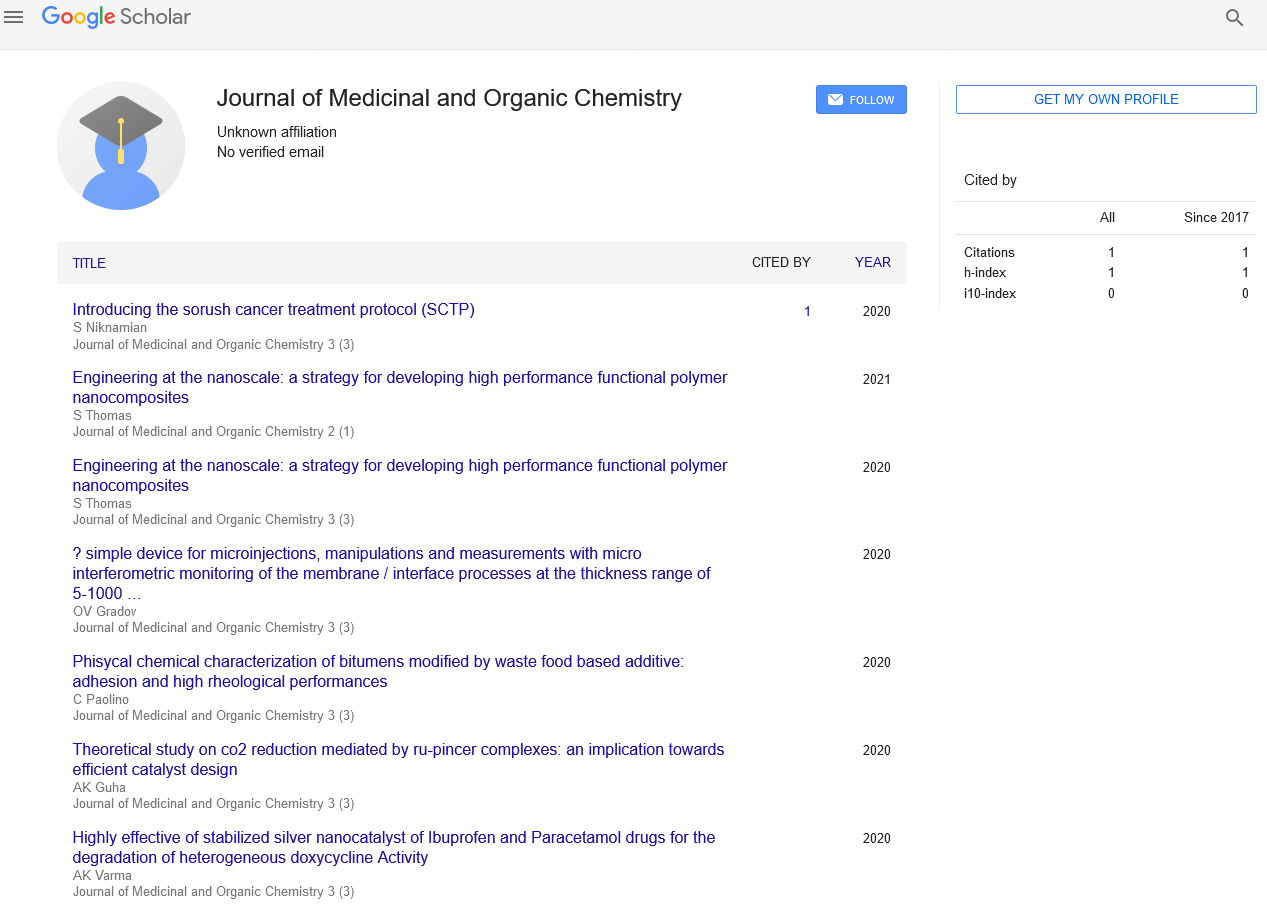Perspective - Journal of Medicinal and Organic Chemistry (2023) Volume 6, Issue 5
Epidemiology: Unraveling the Threads of Health and Disease
- Corresponding Author:
- Vicente Bodi
Department of Cardiology,
University of University of Vellanki,
Valencia,
Spain
E-mail: se.va@idob.etneciv
Received: 15-Sep-2023, Manuscript No. JMOC-23-118857; Editor assigned: 20-Sep-2023, PreQC No. JMOC-23-118857 (PQ); Reviewed: 04-Oct-2023, QC No. JMOC-23-118857; Revised: 19-Oct-2023, Manuscript No. JMOC-23-118857 (R); Published: 27-Oct-2023, DOI: 10.37532/jmoc.2023.6(5).129-130
Introduction
Epidemiology, often referred to as the “science of public health,” is a multidisciplinary field dedicated to understanding patterns of disease and health in populations. Through systematic investigation, data analysis, and interpretation, epidemiologists seek to unravel the intricate threads that connect health and disease in communities and the world at large. In this we will explore the essence of epidemiology, its historical evolution, key principles, contemporary applications, and its pivotal role in safeguarding global well-being.
Description
The essence of epidemiology
Epidemiology is the science of studying the distribution, determinants, and outcomes of health and disease in populations. It focuses on answering crucial questions: What diseases are affecting a community? Why are they occurring? And how can we prevent or control them? Epidemiologists employ rigorous research methods to investigate the causes and consequences of health-related events.
Historical evolution of epidemiology
John Snow and the broad street pump: John Snow, a British physician, is often considered the father of modern epidemiology. His work during the 1854 cholera outbreak in London involved mapping cases of cholera and identifying a contaminated water pump on Broad Street as the source of the disease. This landmark event marked the beginning of epidemiology’s role in identifying the source of epidemics.
The Framingham heart study: The Framingham heart study, initiated in 1948, became a model for long-term epidemiological research on cardiovascular diseases. It contributed to our understanding of risk factors for heart disease, such as high blood pressure and high cholesterol levels.
Global eradication of smallpox: The successful global campaign to eradicate smallpox, driven by epidemiological efforts, marked a historic achievement for public health. Through vaccination programs and surveillance, smallpox was declared eradicated in 1980.
Emerging infectious diseases (Late 20th century): As globalization and urbanization increased, the field of epidemiology adapted to the emergence of new infectious diseases. Outbreaks of diseases like HIV/AIDS, SARS, and Ebola required rapid and coordinated responses.
Key principles of epidemiology
Disease distribution: Epidemiologists examine the occurrence of diseases within populations, identifying patterns, trends, and variations in the distribution of health outcomes.
Disease determinants: They investigate the factors that influence the risk of disease, including genetic, environmental, behavioral, and social determinants.
Risk factors: Epidemiologists identify risk factors associated with specific diseases. These may include lifestyle factors (e.g., smoking and diet), biological factors (e.g., genetics), and environmental factors (e.g., pollution).
Causality: Establishing causality is a fundamental principle. Epidemiologists strive to determine whether an exposure, such as smoking, actually causes a specific health outcome, such as lung cancer.
Prevention and control: Epidemiology plays a crucial role in disease prevention and control. It informs strategies for disease prevention, intervention, and public health policy.
Contemporary applications of epidemiology
Infectious disease surveillance: Epidemiologists monitor and investigate infectious disease outbreaks, such as flu epidemics and emerging infectious diseases like COVID-19. They provide data for timely responses and vaccination campaigns.
Chronic disease research: Epidemiology is essential for understanding and combating chronic diseases, including cancer, diabetes, and heart disease. Researchers study risk factors and patterns to develop interventions and public health initiatives.
Environmental epidemiology: This subfield examines the relationship between environmental factors, such as air and water quality, and health outcomes. It plays a critical role in environmental policy and regulation.
Epidemiology in disaster response: Epidemiologists are crucial in disaster response and recovery efforts, assessing health needs, preventing disease outbreaks, and coordinating relief efforts.
Vaccine development and immunization programs: Epidemiology informs vaccine development and assessment, ensuring the safety and efficacy of vaccines. It also guides vaccination programs and strategies.
Global health and epidemiology
Pandemic preparedness: In an increasingly interconnected world, epidemiologists play a pivotal role in pandemic preparedness. Their work is critical in monitoring and responding to infectious disease threats that can cross borders.
Eradication efforts: Epidemiology is instrumental in global efforts to eradicate diseases like polio and Guinea worm disease. Surveillance and vaccination campaigns are coordinated with the goal of complete eradication.
Health equity: Epidemiologists work to address global health disparities and reduce health inequities, particularly in low- and middle-income countries. Their research guides interventions to improve health for marginalized populations.
Health systems strengthening: Strengthening health systems is crucial for global health security. Epidemiology provides evidence-based strategies for building robust healthcare infrastructure.
Challenges and future directions
Data quality and accessibility: Ensuring the quality of data and its accessibility in diverse settings, including resource-limited areas, remains a challenge.
Emerging infectious diseases: As new diseases continue to emerge, rapid response and global cooperation are paramount in controlling and preventing outbreaks.
Vaccine hesitancy: Addressing vaccine hesitancy and misinformation is crucial to ensuring the success of vaccination programs and controlling vaccine-preventable diseases.
Climate change and environmental challenges: The impact of climate change on health is a growing concern. Epidemiologists must adapt to study the complex interplay between environmental shifts and health outcomes.
Conclusion
Epidemiology stands as a beacon for public health, offering insights into the patterns of health and disease that shape our lives. Its historical milestones, key principles, contemporary applications, and global health significance highlight its pivotal role in safeguarding well-being. As we navigate the complex and interconnected world of health and disease, epidemiology remains an essential guide, illuminating the path toward a healthier, safer, and more equitable future for all.

